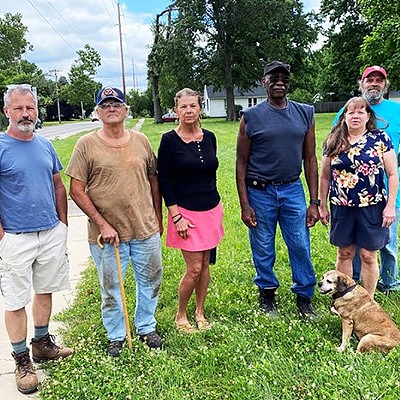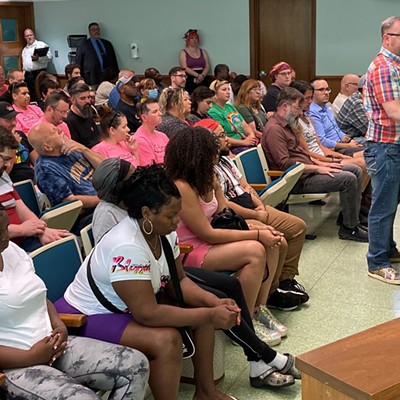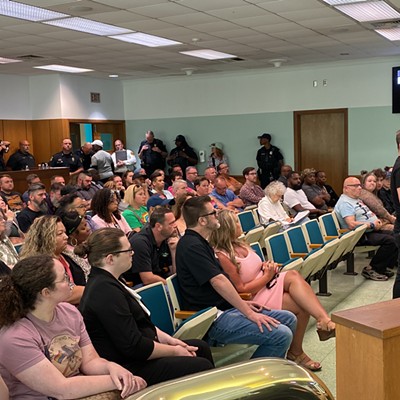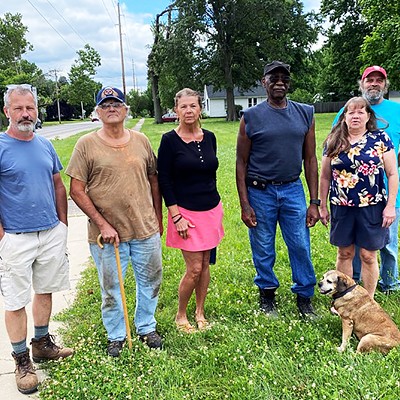Sangamon County State's Attorney John Milhiser says Katherine Smith wasn't present when 19-year-old Dohndre Hughes received a fatal stab wound to the chest in February 2018.
Prosecutors also said they don't believe Smith, a Chatham resident and 18 at the time, anticipated the home invasion, armed robbery and theft that she allegedly helped arrange would lead to Hughes' death.
And yet prosecutors were able to charge Smith with first-degree murder. She faces the same potential 20 to 60 years in prison, with no time off for good behavior, that Dayne Woods, the man who allegedly did the stabbing, could be ordered to serve if convicted.
Woods' jury trial began June 24 in Sangamon County Circuit Court and ended June 26 with a guilty verdict on all counts. Woods is scheduled to be sentenced Aug. 2. Smith and a third defendant, who was with Woods when the murder occurred, will be tried separately at later dates.
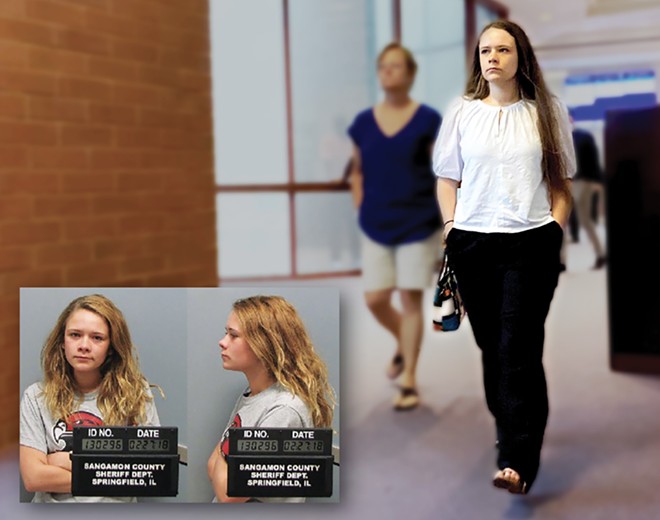
State law allows people to be charged with, and convicted of, first-degree murder if they commit an underlying "forcible felony" that sets off a chain of events leading to a death, even if they didn't intend to injure or kill. Those felonies include home invasion, residential burglary, robbery and kidnapping and aggravated criminal sexual assault.
Known as "felony murder," this way of charging first-degree murder has existed in Illinois and many other states for decades, but criminal justice reform activists want to do away with it or narrow the circumstances in which it can be used.
To Milhiser, felony murder is a useful and necessary tool.

"The purpose is to protect the public from dangerous, criminal behavior," he told Illinois Times. "If you're going to participate in dangerous, criminal conduct, then you can be held accountable for the resulting deadly consequences of that conduct."
Opportunities for using felony murder charges against defendants in homicide cases were narrowed by the Illinois General Assembly in 2021. But advocates of reform are continuing their work to convince state lawmakers that the statute is inherently unfair, leads to unnecessarily long prison sentences, and consequences for individuals and certain segments of society that are harsh and counterproductive.
"Make people responsible for what they did, not for unimagined consequences."
"It's difficult, because at its core, it's about an alleged crime that took place and a death that occurred, and that's tragic," said Scott Main, a criminal defense lawyer in Chicago who sits on the board of nonprofit Restore Justice. "But we should make people responsible for what they did, not for unimagined consequences."
Smith, now 25, faces charges of murder, armed robbery and home invasion in the Feb. 23, 2018, death of Springfield resident Dohndre Hughes, 19. Those are the same charges facing Woods and co-defendant Mark Meszaros, 26, both of Springfield, after Woods and Meszaros allegedly broke into Hughes' home in the 1900 block of East Jackson Street in search of money and marijuana after being led there by Smith.
In opening arguments at Woods' trial, Milhiser said Woods, Smith and Meszaros planned the home invasion and robbery of people in the house who they thought were selling drugs and were unlikely to report the robbery to police.
After Woods and Meszaros broke into the house shortly before 12:30 a.m. Feb. 23, they allegedly yelled "police," and Meszaros used pepper spray to subdue one of the three men living there while Woods, wearing a "police shirt," allegedly entered a bedroom and stabbed Hughes once in the chest, according to Milhiser. The two intruders fled with $600 in cash but later were arrested, along with Smith.
Woods' attorney, Michael Harmon, told jurors in opening arguments at the trial that they don't have to accept Milhiser's narrative that Woods went to Hughes' home to break in and rob him. "You don't have to buy what they're selling," Harmon said.
Woods' case was the first of the three cases that prosecutors wanted to conclude, and his trial faced delays related to several factors, including changes of lawyers representing him and the COVID-19 pandemic that slowed judicial systems throughout the country.
Woods is being held at the Sangamon County Jail on $2 million bond, as is Meszaros. The pair also were charged with felony murder.
Smith was released from jail in mid-May, more than six years after her arrest, and put on home confinement and electronic monitoring while awaiting trial.

Braud initially denied release, agreeing with Milhiser's argument that Smith's release "posed a real and present threat to the safety of any person or persons in the community."
But Wykoff appealed Braud's decision to the Illinois Appellate Court to gain release for Smith, who previously had no criminal history, was working as a retail sales associate and taking classes at Lincoln Land Community College at the time of her arrest.
The Appellate Court ruled in early May that Braud had "erred in finding that the defendant posed a threat to the safety of the community and that no conditions of release could mitigate the threat." Braud granted Smith release on May 14.
Smith declined an interview through her lawyer. When asked whether the felony murder statute should be abolished or changed, Wykoff said someone like Smith "should not be punished the same way as someone with a homicidal state of mind."
Likewise, Sangamon County Public Defender Craig Reiser said he and his colleagues in the public defender's office "feel that there should be specific intent before someone can be charged with first-degree murder."
Milhiser said the potential for facing a murder charge can have a deterrent effect on people considering committing forcible felonies. "I'd like to think it does," he said.
But Reiser said he has never heard of defendants he has represented being aware of murder as a potential charge if someone dies during a robbery or other crime.
SAFE-T Act narrowed, but did not abolish, felony murder laws
According to Restore Justice, the United States is the only country in which felony murder laws exist. The law originated in England but was abolished there in 1957. Illinois criminal laws have included felony murder since 1827, but the options for charging it were expanded in 1961 and later years in the wake of court decisions, board member Main said.
Tucked inside the SAFE-T Act was a provision that narrowed felony murder. As a result, the bar is now higher to charge someone in certain circumstances. An alleged robber, for instance, now can't be charged with felony murder if the person being robbed fires a gun in defense and ends up killing the robber's accomplice or an innocent bystander.
Reform advocates said the change would have prevented murder charges against four Lake County teenagers whose friend was killed during an alleged burglary in 2019. The prosecutor later decided to drop the murder charges for lesser charges under an agreement with the families of the suspects.
Before the 2021 change, Illinois had one of the broadest felony-murder laws in the country, according to Restore Justice.
"The theory behind felony murder establishes strict liability without requiring any culpable mental state around the actions that caused the death," the Chicago-based group says on its website, noting that some people can be eligible for sentences of natural life in prison.
"As such, there are people serving life in prison today, convicted under the felony-murder law, without any involvement in the associated murder," the group says.
Even after the 2021 change, Illinois law continues to allow people to be charged with murder if they or a codefendant causes a death during the commission of an underlying felony even if that death couldn't have been foreseen.
Bills introduced by Sen. Robert Peters and Rep. Justin Slaughter, both Chicago Democrats, in the 2019-2020 legislative session would have allowed felony-murder charges only if the participant in a forcible felony "knew that the other participant would engage in conduct that would result in death or great bodily harm."
But those bills failed to progress during the session, received no votes in committee and died.
Injustice Watch, a Chicago-based nonprofit journalism organization that examines issues involving equity and justice in the court system, did an analysis and reported in 2022 that at least 198 people serving time in the Illinois Department of Corrections had been charged with felony murder.
An Injustice Watch story in January 2022 said the state doesn't track how many people have been charged with felony murder. But the organization said "at least dozens of people are serving time in Illinois prisons on murder charges that likely wouldn't have been filed" if the charges were filed after the 2021 change in the law.
Milhiser, a Republican, said felony-murder charges have been leveled against defendants in Sangamon County 13 times since 2019, and the majority of charges remain pending.
Milhiser said he didn't know of any instances in which felony murder was charged in a situation addressed by the 2021 change, involving a third party who accidentally killed someone during a forcible felony initiated by someone else.
Young people of color, women most impacted
The Injustice Watch story said the group's "data on felony-murder cases, though limited, mirrors what other research has shown: Felony murder laws disproportionately impact young people of color and women."
The group said Black men 25 and younger made up about 40% of those charged with felony murder in Illinois.
Young people are more at risk of the charges because the brains of teens and young adults aren't fully developed, making them less likely to anticipate "the potential consequences of their actions," according to Injustice Watch.
Women can be more likely to be drawn into criminal conduct because of domestic violence and lives filled with trauma, making it harder for them to say no to the instigators of forcible felonies, the group said.
Milhiser said he and his colleagues in the State's Attorney's Office take all of those factors into consideration when making decisions on charges. And he said judges weigh all of the circumstances in cases before deciding from a wide range of years in prison sentences.

The fear of a potential prison term for murder can scare a defendant into pleading guilty to a lesser charge, or pleading guilty to lesser charges that are unduly severe, she said.
Making felony-murder charges more difficult to file "forces prosecutors to work harder, to put together a better case," Cates said. "How easy it is for prosecutors to back people, particularly kids, into a corner in terms of taking a plea deal and agreeing that they are guilty when they are not. ... In their eyes, they're not guilty of murder. They weren't there. They weren't part of it. But that murder charge creates power – quick, easy power."
More legal reforms possible
The SAFE-T Act containing the 2021 reform wasn't supported by any Republicans in the Democratic-controlled Illinois House and Senate.
Slaughter told Illinois Times he is working on more changes to the felony-murder law and hopes a bill with those changes can be passed in the spring session that begins in January "to address the individuals who are most culpable for the murder. There are more efforts to continue to look at certain scenarios."
Passage of criminal-justice reforms that reduce mass incarceration – which disproportionately affects low-income, Black neighborhoods and leads to even more crime and poverty – can take years to achieve, he said.
State Sen. Steve McClure, R-Springfield, a former Sangamon County assistant state's attorney, said he opposed the 2021 change in the felony-murder statute as well as the overall SAFE-T Act. He said he will oppose future changes, as well.
"If you're responsible for events that cause the death of someone, you should be held accountable," he said, and forcible felonies are no exception.
"When you engage in behavior like that, any reasonable person could see that other bad things could happen ... and people could die," McClure said.
Many people who advocate for criminal-justice reforms are "just trying to empty the prisons" and "don't care" about the ramifications, he said.
Illinois has a long way to go to achieve what the California legislature achieved in refining its felony murder statute in 2018, Slaughter said. That state prevented codefendants in an underlying felony from being charged with felony murder unless they participated in a killing with "reckless indifference to human life."
In addition, the new California law allowed people who were serving prison sentences before the law was changed to seek resentencing. The 2021 narrowing of felony-murder charges in Illinois wasn't retroactive.
Marshan Allen, 48, a Chicago-area resident, served almost 25 years in prison after being convicted of felony murder for stealing a car connected to a drug-related home invasion in Chicago that resulted in the deaths of two people.
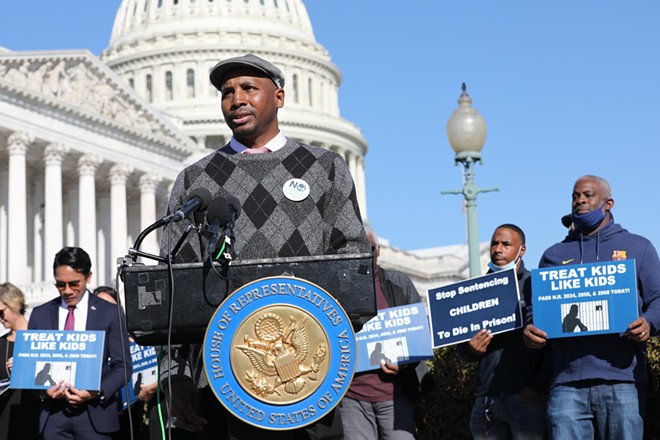
Allen said he would like to see felony murder abolished as a charge because prosecutors don't need it to convict those truly responsible for murders.
"I definitely don't think it's being soft on crime," said Allen, who is attending law school and working as director of policy and communications for the pro-reform Illinois Prison Project.
"It's holding people accountable for the crimes they committed," he said. "You don't have to label people as a murderer to hold them accountable for a crime."
Dean Olsen is a senior staff writer at Illinois Times. He can be reached at 217-679-7810, [email protected] or twitter.com/DeanOlsenIT.
Editor's note: This story has been updated to reflect the guilty verdict on all counts handed down by a jury June 26 against Dayne Woods in the 2018 murder of Springfield resident Dohndre Hughes.







